Joint health is essential for staying active and living comfortably. Whether you’re playing sports, working long hours, or enjoying retirement, strong and flexible joints help you move easily and do daily tasks without pain. Over time, repetitive movement, bad posture, injuries, or aging can put stress on your joints. This often leads to stiffness, discomfort, or more serious issues like arthritis or joint damage.
Although medical treatments and exercise are important for joint care, what you eat can make a big difference. A balanced diet gives your body the tools it needs to stay strong. Certain foods can support your joints naturally and help slow down damage caused by age or overuse.
Nutrients like healthy fats, antioxidants, and anti-inflammatory compounds can help reduce swelling, protect cartilage, and ease joint pain. By adding the right foods to your meals, you can support your joints and lower the risk of long-term joint problems. Simple changes in your diet can help you stay active and pain-free.
In this article, we’ll explore the connection between diet and joint health, examine the key nutrients essential for joint maintenance, and highlight the best foods to include in your diet to keep your joints flexible, strong, and pain-free.
Understanding Joint Health
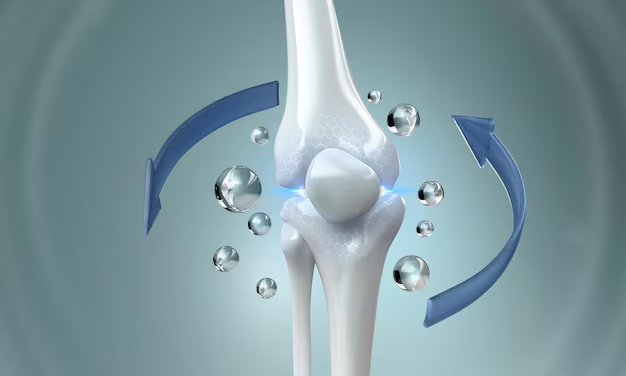
Joints are where two or more bones meet in the body. They play an important role in helping you move, bend, and stay flexible. Without joints, simple actions like walking, lifting, or turning would be impossible.
Besides allowing movement, joints also provide support and help absorb shock when you do everyday activities like running or jumping. They act like cushions that protect the bones from rubbing together. Healthy joints are key to staying active and pain-free.
Major types of joints include:
Synovial joints (e.g., knees, shoulders): Most mobile, containing fluid that lubricates the cartilage.
Cartilaginous joints (e.g., spine): Limited movement, connected entirely by cartilage.
Fibrous joints (e.g., skull): Fixed, with no movement.
Healthy joints have smooth cartilage at the ends of bones, synovial fluid to lubricate movement, and strong connective tissues such as ligaments and tendons.
Common Joint Issues
Osteoarthritis (OA): Wear-and-tear disease causing cartilage breakdown.
Rheumatoid Arthritis (RA): Autoimmune disorder causing inflammation of the joint lining.
Gout: Caused by uric acid crystal buildup in joints.
Bursitis and Tendinitis: Inflammation of joint-supporting tissues.
Key Nutrients for Joint Health

Eating the right nutrients is important for keeping your joints strong and flexible. Joint health foods can help reduce pain, improve movement, and protect your joints from damage as you age. Including certain vitamins and minerals in your meals supports healthy cartilage and connective tissues.
Omega-3 fatty acids, found in fish like salmon and mackerel, are well-known for their anti-inflammatory benefits. These healthy fats help reduce swelling in the joints, which can ease stiffness and discomfort. They are an important part of any joint-friendly diet.
Vitamin C, found in fruits like oranges and strawberries, helps your body build collagen, which supports cartilage. Collagen keeps joints cushioned and working smoothly. Antioxidants in these fruits also protect the joints from harmful free radicals.
Calcium and vitamin D are also important joint health foods. They help maintain strong bones and support the joints that connect them. Leafy greens, dairy products, and fortified cereals are great sources to include in your daily meals.
Top Foods for Joint Health
Fatty Fish
Fatty fish like salmon, mackerel, sardines, and tuna are excellent joint health foods. They are rich in omega-3 fatty acids, which help lower inflammation in the body. Inflammation is a common cause of joint pain and stiffness, especially in people with arthritis. Eating fatty fish regularly can ease discomfort and support smoother movement in the joints.
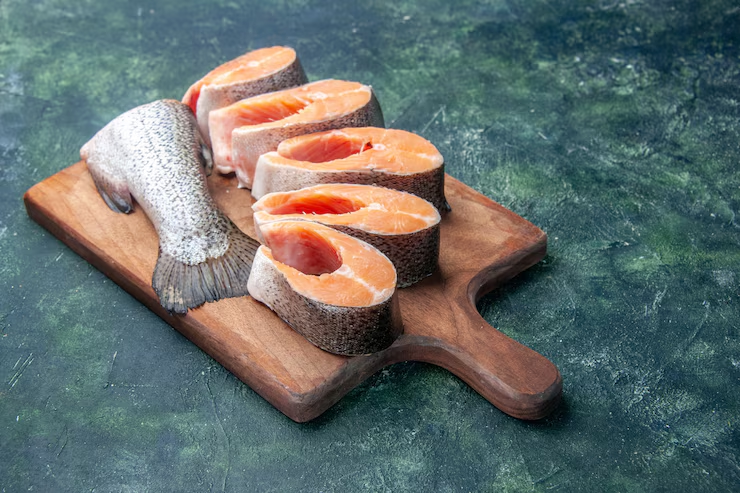
These fish also provide vitamin D, which helps the body absorb calcium and supports bone strength. Strong bones are important for keeping your joints stable and protected. Adding fatty fish to your meals two to three times a week is a natural and effective way to care for your joints. Including them in your diet makes a big difference in maintaining flexibility and reducing the risk of joint problems.
Why It Helps: Rich in omega-3s and vitamin D, fatty fish like salmon, sardines, and mackerel reduce joint inflammation and morning stiffness.
Tip: Aim for two servings per week. Grill or bake instead of frying to preserve nutrients.
Berries
Berries such as strawberries, blueberries, raspberries, and blackberries are powerful joint health foods. They are packed with antioxidants, especially vitamin C, which helps protect the joints from damage caused by free radicals. Vitamin C also supports collagen production, an important part of healthy cartilage that cushions and protects your joints during movement.
Berries also have natural anti-inflammatory properties that can reduce joint pain and stiffness. Their rich color comes from plant compounds called anthocyanins, which may help lower inflammation in the body. Including a handful of fresh or frozen berries in your daily meals or snacks is a simple way to support joint health. These tasty fruits not only improve joint function but also support overall wellness.
Why It Helps: Berries are rich in antioxidants (anthocyanins) and vitamin C, which neutralize free radicals that can damage joints.
Top Picks: Blueberries, raspberries, strawberries.
Leafy Greens
Leafy greens like spinach, kale, collard greens, and Swiss chard are excellent joint health foods. They are rich in vitamins A, C, and K, which help reduce inflammation and protect the joints. Vitamin C supports collagen production, while vitamin K plays a role in maintaining healthy bones and cartilage. These nutrients work together to keep joints strong and flexible.
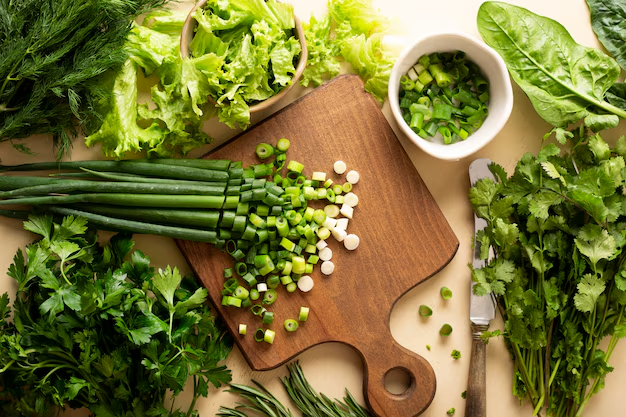
Leafy greens are also a good source of calcium and antioxidants, which help protect the joints from wear and tear. Including leafy greens in salads, soups, or smoothies is an easy way to boost joint health. Their powerful nutrients support not only the joints but also the bones they connect to, making them a key part of any joint-friendly diet.
Why It Helps: Kale, spinach, and Swiss chard contain vitamin K and calcium, crucial for bone strength and reducing inflammation.
Bonus: They’re also rich in antioxidants like lutein and beta-carotene.
Nuts and Seeds
Nuts and seeds are valuable joint health foods that offer a rich source of healthy fats, protein, and essential minerals. Varieties like almonds, walnuts, flaxseeds, and chia seeds contain omega-3 fatty acids, which help reduce joint inflammation and support smoother movement. These healthy fats can ease stiffness and provide relief from discomfort linked to joint issues.
In addition to healthy fats, nuts and seeds are packed with antioxidants, fiber, and vitamin E, which protect the joints from damage and support overall joint function. They also contain magnesium and selenium, which help maintain strong bones and reduce inflammation. A small handful of nuts or a sprinkle of seeds added to your meals can offer lasting benefits. Including them regularly in your diet is a smart and easy way to support long-term joint health naturally.
Why It Helps: Almonds, walnuts, flaxseeds, and chia seeds provide healthy fats, magnesium, and plant-based protein.
Tip: Add to smoothies, yogurt, or salads for an anti-inflammatory punch.
Olive Oil
Olive oil is one of the most beneficial joint health foods you can add to your diet. It contains healthy monounsaturated fats and a compound called oleocanthal, which has strong anti-inflammatory properties. These natural compounds can help reduce swelling and joint pain, especially in people dealing with arthritis or chronic joint issues.
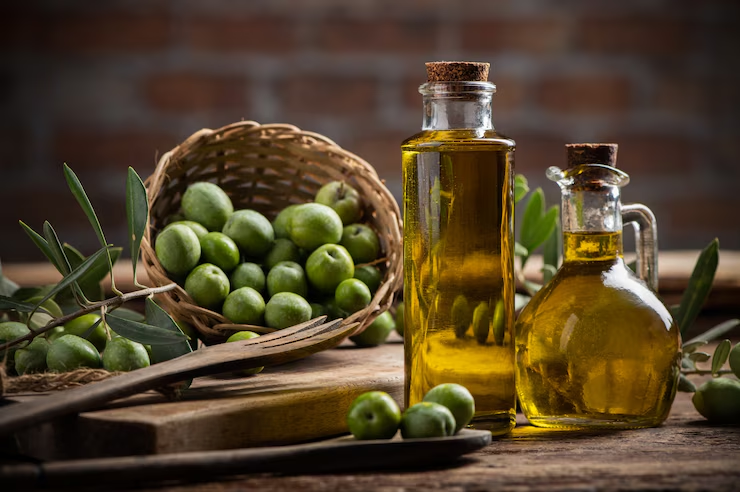
Using olive oil in your cooking or as a salad dressing supports joint function and may help slow cartilage damage over time. It also provides antioxidants that protect joint tissues from harmful free radicals. Replacing unhealthy fats like butter or margarine with olive oil is a simple change that can make a big difference. Regular use of olive oil not only improves joint health but also supports heart health and overall wellness.
Why It Helps: Extra virgin olive oil contains oleocanthal, a compound with anti-inflammatory properties similar to ibuprofen.
Usage: Use as a salad dressing base or drizzle on roasted vegetables.
Whole Grains
Whole grains are an important part of a balanced diet and are considered one of the best joint health foods. They are packed with fiber, vitamins, and minerals that support overall health. Whole grains like brown rice, oats, quinoa, and whole wheat help reduce inflammation in the body, which is key for easing joint pain and stiffness. The fiber also supports a healthy digestive system, which plays a role in controlling inflammation levels.
Including whole grains in your daily meals can help improve energy levels and support joint function over time. Unlike refined grains, whole grains retain their natural nutrients, offering better support for joint tissues. By replacing white bread or pasta with whole grain options, you’re making a smart choice for your long-term joint health. For anyone looking to improve mobility and reduce joint discomfort, whole grains are a helpful addition.
Why It Helps: Oats, brown rice, quinoa, and barley help lower C-reactive protein (CRP), a marker of inflammation linked to arthritis.
Caution: Choose whole over refined grains to avoid sugar spikes and inflammation.
Garlic and Onions
Garlic and onions are powerful joint health foods known for their natural anti-inflammatory properties. These vegetables contain compounds like sulfur and quercetin that may help reduce swelling and protect joints from damage. Sulfur plays a role in building strong connective tissues, which support joints and help keep them flexible. Regularly eating garlic and onions can also boost the immune system, which may help prevent joint problems caused by inflammation.
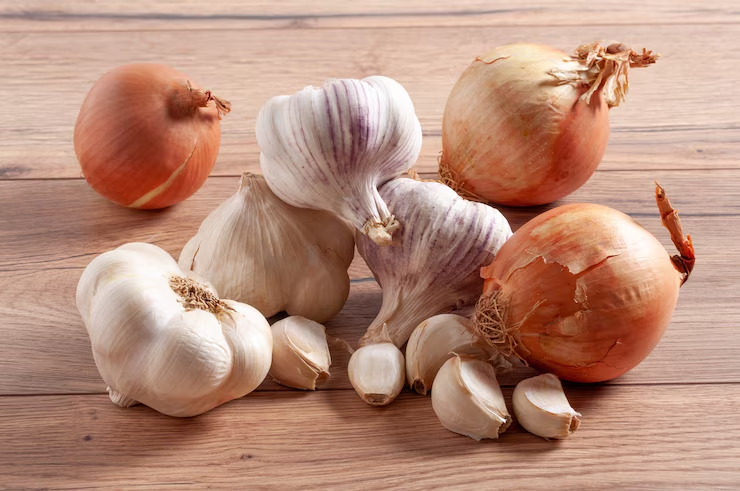
Adding garlic and onions to your daily meals is an easy and tasty way to support joint health. You can use them in soups, stir-fries, or salads to get their full benefits. These foods are not only good for your joints but also help with overall health. For those looking to care for their joints naturally, garlic and onions are simple and effective choices.
Why It Helps: Rich in sulfur compounds that may reduce cartilage damage. Garlic also enhances the immune system.
Pro Tip: Fresh crushed garlic provides the most benefits.
Bone Broth
Bone broth is one of the most beneficial joint health foods because it contains natural compounds that support joint strength and flexibility. It is rich in collagen, gelatin, and amino acids, which help rebuild cartilage and reduce joint pain. Drinking bone broth regularly may also help reduce inflammation, making it easier to move without discomfort.
This warm and nourishing drink is easy to include in your diet. You can sip it alone or use it as a base for soups and stews. Many people find that bone broth not only supports joint health but also improves skin and gut health. As a natural and traditional remedy, bone broth is a simple and effective way to care for your joints and stay active.
Why It Helps: High in collagen, glucosamine, and chondroitin—all known to rebuild cartilage and reduce pain.
Homemade Tip: Simmer bones with vinegar and vegetables for 12–24 hours for maximum extraction.
Turmeric
Turmeric is a popular spice known for its powerful anti-inflammatory effects, making it one of the top joint health foods. It contains curcumin, a natural compound that helps reduce joint pain and swelling. Many people with joint problems, like arthritis, use turmeric to manage discomfort and improve mobility. Curcumin may also help protect the joints from further damage over time.
Adding turmeric to your meals is an easy way to support your joint health naturally. You can sprinkle it in curries, soups, or even mix it with warm milk. For better results, it’s often combined with black pepper to help the body absorb it more easily. Turmeric is a simple and natural way to take care of your joints and enjoy more comfort in daily movement.

Why It Helps: Contains curcumin, a potent anti-inflammatory compound shown to reduce joint pain in osteoarthritis and RA.
Tip: Combine with black pepper (piperine) to boost absorption.
Green Tea
Green tea is one of the healthiest joint health foods, known for its powerful antioxidants and anti-inflammatory effects. It contains compounds like catechins that help reduce inflammation in the joints and protect the cartilage from wearing down. Regularly drinking green tea may help ease joint pain and support better movement, especially in people with arthritis or stiffness.
This calming drink is easy to enjoy daily and can be a smart part of a joint-friendly diet. You can drink it hot or cold, and it’s a great alternative to sugary beverages. Green tea not only supports joint health but also helps with weight control, which reduces pressure on the joints. By adding green tea to your routine, you give your body natural support for stronger and more comfortable joints.
Why It Helps: Loaded with polyphenols and catechins, green tea may prevent cartilage breakdown and reduce arthritis inflammation.
Bonus: It’s also hydrating, which supports joint lubrication.
Foods to Avoid for Joint Health
Some foods can worsen joint inflammation, increase stiffness, or contribute to cartilage breakdown. Avoid or limit:
Processed and Red Meats – Increase inflammation markers.
Sugary Drinks and Snacks – High sugar leads to inflammation and weight gain.
Refined Carbohydrates – White bread and pasta can spike blood sugar and CRP levels.
Trans Fats – Found in fried and packaged foods, harmful to joint health.
Excess Alcohol – Can trigger flare-ups in people with gout and weaken bones over time.
Excess Salt – High sodium can lead to calcium loss, weakening bones and joints.
Lifestyle Tips to Complement Your Diet
Eating joint-healthy foods is most effective when combined with other healthy habits:

Stay Hydrated – Water supports synovial fluid production for joint lubrication.
Maintain a Healthy Weight – Every pound of excess weight adds stress to joints, especially the knees.
Exercise Regularly – Strengthens muscles around joints and keeps them mobile. Low-impact activities like swimming and walking are excellent.
Avoid Smoking – Tobacco impairs blood flow, delays healing, and worsens arthritis symptoms.
Sleep Well – Quality sleep allows tissues and cartilage to regenerate.
Sample 1-Day Joint Health Meal Plan
| Meal | Foods Included |
|---|---|
| Breakfast | Oatmeal with chia seeds, blueberries, and almond milk |
| Snack | Handful of walnuts and green tea |
| Lunch | Grilled salmon over spinach and quinoa salad with olive oil and lemon dressing |
| Snack | Greek yogurt with strawberries and a drizzle of honey |
| Dinner | Bone broth-based chicken soup with garlic, onions, turmeric, and veggies |
| Hydration | 8–10 glasses of water + optional herbal tea |
Conclusion
In conclusion, adding the right joint health foods to your daily diet can make a big difference in how your joints feel and function. Foods like whole grains, garlic, onions, turmeric, and green tea are full of nutrients that help reduce swelling and protect joint tissues. They support your body naturally, helping you stay active and mobile.
Choosing these foods regularly helps keep your joints strong and reduces the chances of future problems. Instead of relying only on medicine, you can use food as a simple way to support your joints every day. These natural options also bring other health benefits like better digestion, improved immunity, and more energy.
Whether you’re already facing joint issues or just want to stay healthy as you age, including joint health foods in your meals is a smart step. They are easy to find, simple to prepare, and can lead to long-term joint comfort and strength.
FAQs
- What are the best joint health foods to include in my diet ?
Some of the best joint health foods include whole grains, garlic, onions, turmeric, green tea, and bone broth. These help reduce inflammation and support joint strength. - How does green tea help with joint health ?
Green tea contains antioxidants and anti-inflammatory compounds that protect joints, ease pain, and improve movement over time. - Can turmeric really reduce joint pain ?
Yes, turmeric contains curcumin, which has natural anti-inflammatory effects. It may help reduce swelling and pain in the joints when used regularly. - Is bone broth good for daily use ?
Yes, drinking bone broth daily is safe and can support joint health by providing collagen and amino acids that help rebuild joint tissue. - How quickly do joint health foods work ?
Results vary, but with regular use, many people notice reduced joint discomfort and better flexibility within a few weeks.


